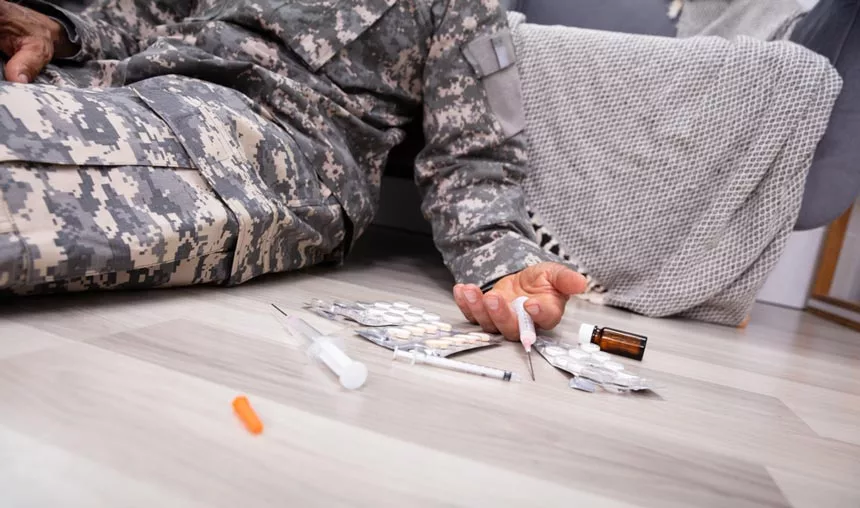The Army Substance Abuse Program (ASAP)
The Army Substance Abuse Program (ASAP) is an important part of the overall Army health and safety program. It is designed to provide soldiers with the resources and support they need to make informed decisions about the use of alcohol or other drugs and to protect their health and well-being.
The basic goal of the military ASAP program is to create a safe and healthy environment for all soldiers. The program provides education, prevention, and intervention services to reduce the risk of harmful alcohol and other drug use. It also seeks to promote the physical, psychological, and social health of soldiers and their families.
Keep reading to learn more about how ASAP can provide alcohol and drug abuse prevention and treatment services, and how you can provide continued military service even after addiction through participating in this program.
The Find Addiction Rehabs team is available to help you find confidential and effective alcohol addiction treatment programs nationwide. Call now to get started!
The Relationship Between Substance Abuse and the Military

The relationship between substance abuse and the military is a complex one that has been a source of concern for both military personnel and the Department of Defense for many years. The military, like the general population, is affected by substance abuse in a variety of ways.
Drug and alcohol abuse can lead to increased absenteeism, decreased productivity, and a higher risk of accidents and injuries. Substance abuse can also jeopardize readiness and interfere with soldiers’ abilities to be appropriately trained for combat situations.
Whether engaging in prescription drug misuse, illicit substance abuse, or alcohol abuse, this can all lead to a decrease in morale and an increase in disciplinary problems and criminal activity, all of which can have a negative impact on unit cohesion and mission readiness.
The Department of Defense has taken several steps to address substance abuse in the military. All branches of the military have implemented programs and policies to prevent and reduce substance abuse in the ranks, including educational programs, drug testing, and disciplinary measures.
The military also provides a variety of services designed to help service members and their families cope with and recover from substance abuse, including counseling, rehabilitation programs, and support groups.
In addition to these services, the DOD has also implemented programs to address these issues and improve overall unit readiness, such as providing mental health resources, job training, and housing assistance.
Army Substance Abuse Program Goals
The overarching goal of ASAP is to provide alcohol and other drug abuse deterrence, prevention, education, and treatment resources to Army personnel and their families to reduce the risk of substance abuse in their lives.
The Army Substance Abuse Program’s mission is to implement alcohol and drug prevention strategies as a means of strengthening the overall fitness and effectiveness of the Army’s workforce, conserving manpower, and enhancing the combat readiness of soldiers.
With the various prevention strategies and drug-risk reduction services provided by ASAP, this program is able to achieve maximum productivity within its workforce and emphasize alcohol and drug-free mindsets, as well as strengthen the overall fitness and effectiveness of military members.
Services Provided by the Army Substance Abuse Program

ASAP includes a range of activities to help soldiers reduce their risk of harm from alcohol and other drugs. These activities include:
- Prevention and Education: The program provides information, resources, and services to help soldiers make informed decisions about alcohol and other drug use. This may include enforcing drug-free leisure activities and other drug abuse prevention strategies.
- Screening and Assessment: Soldiers are screened periodically to identify potential alcohol and other drug problems. If problems are identified, the soldier is referred for assessment and treatment.
- Treatment and Support: Soldiers who need help with alcohol or other drug problems are referred to specialized treatment programs. The program also provides support to help soldiers make lifestyle changes that reduce the risk of harm from alcohol and other drugs.
- Monitoring: Soldiers in treatment are monitored to ensure that their condition is improving and that they are adhering to the recommended treatment plan.
The Army Substance Abuse Program is an important part of the Army’s overall health and safety program. It provides soldiers with the resources and supports they need to make informed decisions about alcohol and other drug use and to protect their health and well-being.
Who Can Participate in the Army Substance Abuse Program?
The Army Substance Abuse Program is voluntary and open to all active-duty Army personnel and substance-impaired soldiers, including active-duty National Guard and Reserve members, active-combat soldiers, civilian corps members, and personnel assigned to other jobs or roles.
Joining a Military Addiction Treatment Program
Joining a military addiction treatment program is an important step for any service member struggling with substance abuse. This type of program is specifically designed to address the unique challenges faced by military personnel and their families.
Through individual counseling and group therapy, military addiction treatment programs provide the resources and support needed to help service members overcome their addictions and achieve long-term sobriety.
When service members participate in a military addiction treatment program, they are typically assigned a counselor or therapist who specializes in treating members of the military and their families.
During their first session, the counselor will typically discuss the service member’s history of substance abuse and any other contributing factors, such as traumatic experiences or pre-existing mental health issues.
The ASAP Program: What Happens Next?
The counselor will then devise a personalized treatment plan to meet the individual’s needs. This plan may include individual counseling sessions, group therapy sessions, specialized treatments, and/or medications.
A military addiction treatment program may also provide educational resources, such as articles and videos, to help encourage commanders and service members to better understand their addiction and how to effectively manage it.
Additionally, the program may offer peer support groups and family counseling to help family members better understand the process of addiction and recovery. Because addiction is a chronic disease, it requires long-term treatment and support to achieve long-term recovery.
Over the course of treatment, service members in a military addiction treatment program will work on developing coping strategies and positive lifestyle habits to help them stay sober. Ultimately, the goal of treatment is to help service members learn to manage their addiction and build a strong support system.
The Benefits of Seeking Private Treatment Options

When it comes to overcoming substance abuse and addiction, private addiction treatment is often the preferred choice for those looking for a personalized and supportive approach to recovery.
Private treatment is typically tailored to the individual’s needs, allowing for a more individualized approach that is more effective than group sessions and other forms of treatment. This means that treatment will be tailored to your particular circumstances and can be adjusted as needed to ensure the best possible outcomes.
Private addiction treatment also provides a safe and secure environment in which to work on overcoming their addiction. This can help keep you away from negative influences and focus on your recovery without feeling judged or shamed.
While ASAP and other military treatment programs can provide convenient recovery options, there are drawbacks to these settings. When looking to achieve lasting sobriety, seeking out private treatment providers will be your best bet. The Find Addiction Rehabs team can help you find effective rehab programs nationwide today!
Using TRICARE Coverage for Alternatives to ASAP
If you or a fellow soldier needs help and has not been ordered to the ASAP program, it can be a better option in many cases to seek treatment privately using your Tricare policy. Many rehab facilities are now ‘in-network’ with Tricare and Find Addiction Rehabs can find you help close to your base, wherever it may be, nationwide.
In the case of military family members, Tricare can also help provide coverage so that your spouse or loved one gets the care they need and deserve. No matter your situation, a confidential call to Find Addiction will provide options and make the path forward more clear.
Get Treatment Options for Yourself or Your Family Now!

If you or a loved one is a service member and struggling with addiction, the Find Addiction Rehabs team is here to help. We understand the uniqueness of your situation, and work with an extensive network of treatment facilities that can address all of your care needs.
Call our 24/7 hotline now, and we will help you take the first step on your path to achieving long-term sobriety, where you can become a better soldier and a happier, healthier version of yourself.
FAQs on the ASAP Program and Addiction Help in the Military
Does Tricare Insurance Cover Addiction Treatment?
Yes, Tricare insurance offers coverage for a variety of addiction treatment services, including inpatient and outpatient treatment programs, detoxification services, medication-assisted treatment (MAT), counseling, and support services for military members.
How Long is the Army Substance Abuse Program?
The length of the Army Substance Abuse Program depends on the individual soldier’s needs but typically ranges from six to twelve weeks. However, some military treatment programs may last up to a year. It is for this reason that it is recommended to seek private treatment options, which can offer more flexible and comprehensive care.

